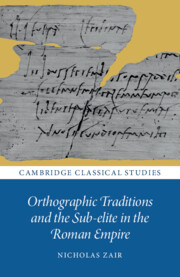In the course of the second century BC, /ɔ/ became /ɛ/ after /w/ and before a coronal, other than a single /r/ (Reference WeissWeiss 2020: 152), for example uoster > uester ‘your’, uoto > ueto ‘I forbid’, aduorsom > aduersum ‘against’. The earliest inscriptional example comes in the Lex repetundarum of 123–122 BC (CIL 12.583), where we find a single example of auersum beside five cases of the spelling <uo>. I have found 6 instances of the <uo> spelling dated to the first century BC, beside 52 examples of <ue>.Footnote 1
This suggests a fairly rapid replacement of the <uo> spelling by the <ue> spelling (although diuortia apparently remained the standard spelling for this word), which is supported by the fact that only 13 instances of <uo> are found datable to the first four centuries AD.Footnote 2 Of these, 5 are instances of the divine name Vortumnus, in which archaic spelling might be expected to be retained longer than in other items. Two late cases of uostras (ICUR 5.14057), uostrum (CIL 8.9081) may well reflect the analogical effect of uōs and noster which led to the *o of the Romance languages in this word (e.g. Spanish vuestro, Italian vostro, French vôtre). We find uortice (AE 2015.1186), uorsum (twice, CIL 6.20674) in verse inscriptions of the second century AD, where the effect is probably intended to be archaising; the latter inscription also features the spellings paussa for pausa ‘pause’, gnatam for nātam ‘daughter’, ollim for ōlim ‘once’, and ollis for illīs ‘them’.
The writers on language make it clear that the <o> spelling is outmoded. Quintilian makes the following comment:
quid dicam ‘uortices’ et ‘uorsus’ ceteraque ad eundem modum, quae primus Scipio Africanus in e litteram secundam vertisse dicitur?
What shall I say about ‘uortices’ and ‘uorsus’ and other words spelt in the same way, in which Scipio Africanus [184–129 BC] is said to have been the first to turn the second letter into e?
While this passage is expressed somewhat cryptically, I take it to mean that he considers the <uo> spelling to be absurdly old-fashioned, and it comes as part of a list of such spellings. Cornutus and Marius Victorinus also address the topic:
‘uostra’ olim ita per o, hodie per e, ut ‘aduorsa’ ‘aduersa’, ‘peruorsa’ ‘peruersa’, ‘uotare’ ‘uetare’, ‘uortex’ ‘uertex’, ‘conuollere’ ‘conuellere’, ‘amploctere’ ‘amplectere’.
uostra used to be written as here with o but now we write e; the same is true of aduorsa beside aduersa, peruorsa beside peruersa, uotare beside uetare, uortex beside uertex, conuollere beside conuellere, amploctere beside amplectere.Footnote 3
‘uoster, uortit’ et similia per e, non per o, scribere debemus.
We ought to write uoster, uortit and the like with e, not with o.
Accordingly, none of the corpora preserves the <uo> apart from the curse tablets. This phonological context appears only in a very few lexical items so there are not that many tokens of it in most corpora (I count 7 instances in the tablets of the Sulpicii, for instance, and 6 in P. Dura, although 5 of these are in the same text), but the curses as a genre happen to contain many instances of uerto ‘I turn’ and lexical items derived from it, so there are particularly large numbers of examples. Only 3 of these (across 2 tablets) appear to show the spelling with <uo>, as opposed to 93 with <ue>. Two belong to the same tablet (Kropp 1.4.2/1, Latium), aruosarius for aduersārius, and aruosaria for aruersāria. Since the tablet is dated to the first half of the first century BC, this usage is not relevant for spelling under the empire. The spelling is probably already old-fashioned, but not overly so, as both /wo/ > /we/ and ar- for ad- before a labial fricative are characteristic of the second century BC. The remaining instance is uostrum for uestrum (1.1.1/1, Arretium, second century AD). Although this text does also include another old-fashioned spelling in the form of uoltis for uultis,Footnote 4 uostrum could again instead be an instance of analogy from uōs and noster.

